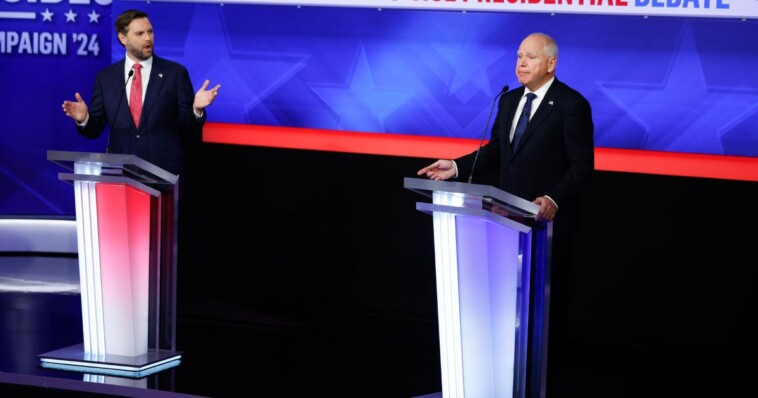By Joe Saunders October 2, 2024 at 6:15am
If a focus group of battleground state voters is any indication, Republican J.D. Vance won the field in Tuesday’s vice presidential debate — and it wasn’t even close.
Pollster Frank Luntz, a political veteran, convened a panel of voters from the states most hotly contested in the November election to view the showdown between the Ohio senator and Democrat Tim Walz.
(Those states include Arizona, Pennsylvania, North Carolina, Michigan, Nevada, and Georgia.)
And while the majority weren’t supporting Vance’s Republican ticket at the beginning of the debate, by the end their opinion of the two debaters’ efforts was clear.
Final focus group vote tonight after the #VPDebate: 12-2 in favor of JD Vance pic.twitter.com/LgahO2za7C
— Frank Luntz (@FrankLuntz) October 2, 2024
“At the first commercial break, my #VPDebate focus group says by a 10-3 margin that JD Vance is winning,” Luntz wrote in a post on the social media platform X early in the proceedings. “That is a big deal since only 5 of them were leaning toward Trump-Vance when the debate began.”
Then came the verdict:
“Final focus group vote tonight after the #VPDebate: 12-2 in favor of JD Vance,” Luntz wrote in a post at the debate’s conclusion.
Did the VP debate significantly help Trump’s chances?
The resounding Vance victory in the Luntz group was in stark contrast to other instant surveys published after the debate, which showed respondents as evenly divided on who won.
A roundup of flash polls published by the liberal website The Daily Beast called the results a “virtual draw.” But that likely reflected partisan opinion overall, rather than actual judgments of the candidates on Tuesday.
The website Politico found a 50-50 split among the viewers it surveyed. But Politico itself acknowledged that that probably had more to do with the preferences of the viewers than the performances on the stage.
“The survey found that party identification strongly shaped the perceptions of people who watched the debate: Democrats overwhelmingly sided with Walz, while Republicans picked Vance as the winner,” Politico wrote.
The article noted that “independents” it surveyed gave the edge to Walz, the current governor of Minnesota, but, unlike Luntz, failed to note how those “independents” were leaning before the contest began.
If the Luntz panel really had only five members leaning toward the Republican ticket headed by former Presdent Donald Trump, Vance’s 12-2 win means he had an uphill battle from the beginning — and that he came out on top anyway.
Certainly, commenters on Luntz’s post thought so.
How was it not 14-0?
— CEO Branding Expert (@Ceo_Branding) October 2, 2024
Thank you, @FrankLuntz.
Complete domination by Vance, in spite of the bias moderators.
— ManchurianFiles (@Democrat_crimes) October 2, 2024
Smart group of undecided. Vance will definitely be a big asset to Trump. I think the partnership will be great for your country!
— Monica (@monibucci) October 2, 2024
As in the Trump debate with President Kamala Harris, where the moderators’ bias was clear, it wasn’t just voters’ preconceptions Vance was battling. He had moderators to deal with, too.
But viewers could see that. And they could see him responding in real time.
And in the end, it wasn’t even close.
Advertise with The Western Journal and reach millions of highly engaged readers, while supporting our work. Advertise Today.



